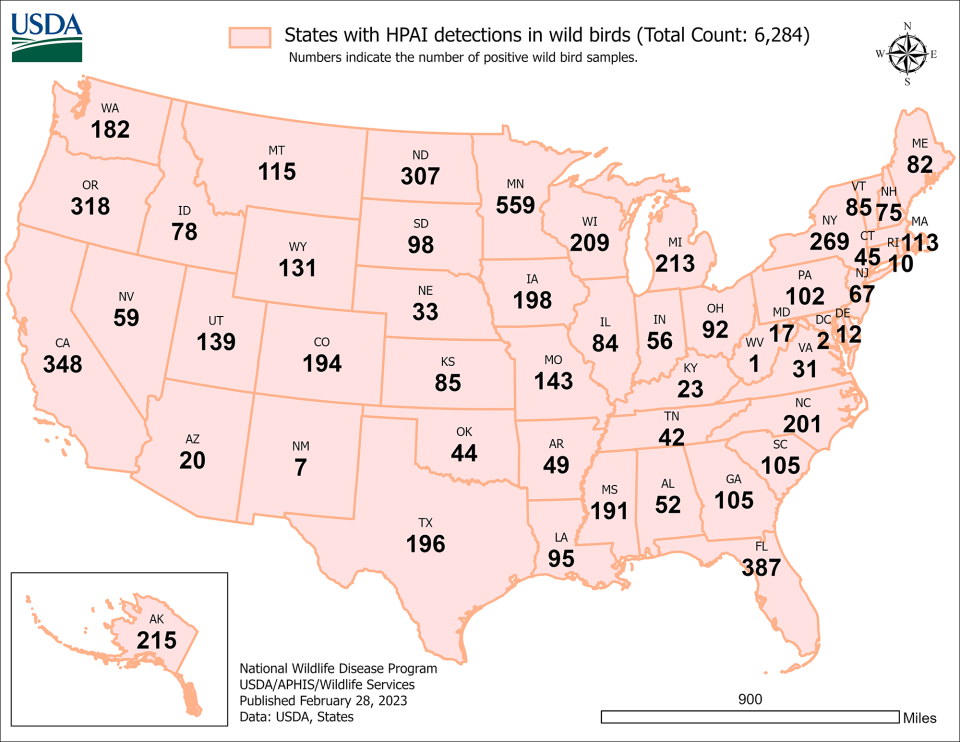Bird flu is killing bald eagles at an 'alarming rate,' researchers say
Bald eagle nest failures and deaths are piling up at an “alarming rate” as a result of the highly infectious avian influenza, University of Georgia researchers announced this week.
The avian influenza strain known as H5N1 is killing an unprecedented number of mating pairs of the national symbol birds, University of Georgia researchers concluded in a study published in Nature’s Scientific Reports.
“Even just one year of losses of productivity like we’ve documented regionally is very concerning and could have effects for decades to come if representative of broader regions,” said Nicole Nemeth, an associate professor at UGA’s college of veterinary medicine, who led the study with 10 other researchers. “There were nights where I couldn’t sleep based on what we were hearing and seeing.”
Are we ready: Is the US prepared for a possible bird flu pandemic? What we know.
What did the research show?
“We had reports from people who faithfully monitor eagle nests year after year with these heartbreaking stories of an adult eagle found dead below their nest, Nemeth said. “Within a few days, often its mate and the chicks were also found dead below the nest. It is clear the virus is causing nest failures.”
Just under half the bald eagle nests in coastal Georgia fledged an eaglet in 2022, 30% below average for the season.
The influenza was documented in Georgia’s bald eagles for the first time in April 2022 after dead eagles were found in Chatham, Glynn and Liberty counties in March.
The success rate for nests in one Florida County was 50% lower than average, dropping from an average of 86.5% to 41%.
What about bald eagles elsewhere?
There have been many reports of bald eagles dying across the U.S. and Canada, said Nemeth, a part of the University of Georgia's Southeastern Cooperative Wildlife Disease Study.
The study has diagnosed cases of the influenza in high numbers of bald eagles and other avian species from member states. The U.S. Fish & Wildlife Service also revealed the influenza is widespread in bald eagles, she said.
Eagles and other raptors probably contract the virus by eating other diseased birds, federal officials say.
BACKGROUND: Bird flu costs accumulate as avian influenza outbreak enters second year
What other birds have been affected?
Since it was first detected in the United States in January 2022, the H5N1 virus has exploded in birds across the country, federal data shows, but also infects other wildlife.
Reports from the U.S. Department of Agriculture and the Centers for Disease Control and Prevention show the virus has:
Has struck more than 58 million domestic poultry animals, including chickens and turkeys, in 777 outbreaks.
Been the subject of 4,672 reports in wild birds.
Infected at least 146 avian species .
Been documented in every state but Hawaii and every Canadian province and territory.
Has spread to 17 other wildlife species in 22 states, including 60 red fox, 16 harbor seals and 14 striped skunks.
Nearly half the infected red foxes were reported in Michigan and Wisconsin.
Nemeth suspects the number of wild bird cases “is drastically underreported.”
“People will submit one snow goose, for example, and it will test positive for the virus,” she said. “And then they’ll tell you, ‘Well, there are thousands of geese dying at the same site.’ But it only goes down as one infected bird.
“We can’t contain the virus, and we can’t vaccinate wild birds," Nemeth said. "But we can document the losses and try to help conserve affected species and populations the best we can.”
Experts say it's likely the virus is being spread when birds or other mammals eat infected birds. The virus affects birds by impairing their nervous systems and making them unable to fly. But some species are more susceptible than others, including the bald eagle.

What humans need to know
The CDC says bird flu strikes primarily in animals, but it has been detected in four people in the United States. Symptoms include eye redness, flulike upper respiratory symptoms that range from mild to severe, fever and body aches.
Also, an 11-year-old girl died in Cambodia in late February.
Dig deeper:
IN MAMMALS: The bird flu outbreak is spilling over into mammals
EGG PRICES: Here's why egg prices are soaring across the US
IN HUMANS: Colorado prison inmate diagnosed with human avian flu; first case of strain detected in US
This article originally appeared on USA TODAY: Bird flu is killing bald eagles at an 'alarming rate,' study says

